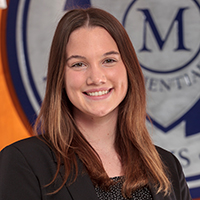
Insight into Internal Medicine: Reflections from MU-WCOM Alumni, Part 3

Specialization in Internal Medicine (IM) allows physicians to practice in a primary care setting and see a variety of clinical presentations. Because of the vast spectrum of avenues and patient populations that an IM physician can work with, I spoke with alumni from the Marian University Tom and Julie Wood College of Osteopathic Medicine (MU-WCOM) to see what led them down their paths to IM.
My purpose in interviewing Arielle Coy, DO '24, Alexander Dile, DO '23, and Nicole Kang, DO '24, is to help introduce the field of Internal Medicine to curious medical students.
How do you balance time between work and life?
Dr. Coy: "This is the hardest part, certainly. Medicine is all-consuming in your early training and that's a fact to simply accept. When I'm not at the hospital, I spend time making up a sleep deficit, riding my bike with my husband, and focusing on keeping myself mentally well."
 Dr. Dile: "Life doesn't stop just because you're in residency, and nor should it. I try to prioritize my time off work spending time outdoors and with friends and family. I was even married during residency and have taken some great trips, as well. Training is hard, but it has been some of the best few years. I think work-life balance is important to master in order to become a more present, compassionate physician."
Dr. Dile: "Life doesn't stop just because you're in residency, and nor should it. I try to prioritize my time off work spending time outdoors and with friends and family. I was even married during residency and have taken some great trips, as well. Training is hard, but it has been some of the best few years. I think work-life balance is important to master in order to become a more present, compassionate physician."
 Dr. Kang: "In outpatient clinics, there are more opportunities to be away from work. You get into a routine and are usually used to being busy, which helps it feel less like a large transition from school. I spend a lot of my free time studying for level 3 or doing research for my fellowship application. I also make time for family and traveling home."
Dr. Kang: "In outpatient clinics, there are more opportunities to be away from work. You get into a routine and are usually used to being busy, which helps it feel less like a large transition from school. I spend a lot of my free time studying for level 3 or doing research for my fellowship application. I also make time for family and traveling home."
What are the options for pursuing a fellowship? And do you have plans to do so?
Dr. Coy: "Internal Medicine boasts several fellowship opportunities—Hematology/Oncology, Gastroenterology, Nephrology, Cardiology (with various subspecialties), Pulmonology and Critical Care medicine, Primary Care, Lifestyle Medicine. I am planning to pursue a fellowship in pulmonology and critical care medicine."

Dr. Dile: "Internal medicine may have one of the most options available to you after residency. You can work inpatient as a hospitalist, outpatient as a PCP, or a combination of both. Or you could pursue more training in fellowship for any organ system. From cardiology, pulmonology or nephrology to infectious disease, allergy or endocrinology. Personally I am interested in pursuing a fellowship in gastroenterology and hepatology."
 Dr. Kang: "There are many options for fellowship. I am planning on applying to cardiology. My advice is to begin research in the specific field early and also pick residency programs that set you up well for fellowship application. Also be okay not matching into a fellowship and staying as an internist."
Dr. Kang: "There are many options for fellowship. I am planning on applying to cardiology. My advice is to begin research in the specific field early and also pick residency programs that set you up well for fellowship application. Also be okay not matching into a fellowship and staying as an internist."
What advice would you give to a medical student considering internal medicine?
Dr. Coy: "If you want to become a well-rounded physician with exposure to pathology from chronic to life-threatening and acute problems, internal medicine is your best bet. There are several fellowship opportunities, and you are guaranteed to use all the hard-earned medical school knowledge you poured your heart, sweat, and tears into."

Dr. Dile: "While every day is not always like the show Scrubs, I think it is important to find something you are passionate about, could envision yourself doing long term, and also vibe with others in the same field. No matter what you choose, you will be spending a lot of your time in residency working, learning, and growing—which comes with its ups and downs. But aim to find something you that truly excites you."
 Dr. Kang: "It is a very rewarding field to be in, but it takes a lot of hard work to get here. Make sure to keep up on your studies, even during breaks or holidays. The information keeps building, and it is important to stay fresh with everything. Also consider joining a research project early to keep yourself competitive."
Dr. Kang: "It is a very rewarding field to be in, but it takes a lot of hard work to get here. Make sure to keep up on your studies, even during breaks or holidays. The information keeps building, and it is important to stay fresh with everything. Also consider joining a research project early to keep yourself competitive."
Summary
In this third part of our series, recent MU-WCOM Internal Medicine graduates share candid reflections on residency life. They detail the challenges of maintaining work-life balance and offer practical tips for self-care and sustaining relationships outside the hospital.
The alumni also discuss the wide array of fellowship opportunities available after residency, from cardiology and gastroenterology to pulmonology and beyond. Their advice for aspiring internists emphasizes the importance of lifelong learning, early involvement in research, and choosing a path that sparks genuine passion.
Come back next week for part four of the interview!
About the Author
 Kylie DeVlaminck is a second-year osteopathic medical student at the Marian University Tom and Julie Wood College of Osteopathic Medicine with an interest in pursuing internal medicine post-graduation. Her interests lie in preventative medicine, improving access to healthcare, and mentorship within medicine. Outside of school, she enjoys exercising, traveling, and spending time with family and friends.
Kylie DeVlaminck is a second-year osteopathic medical student at the Marian University Tom and Julie Wood College of Osteopathic Medicine with an interest in pursuing internal medicine post-graduation. Her interests lie in preventative medicine, improving access to healthcare, and mentorship within medicine. Outside of school, she enjoys exercising, traveling, and spending time with family and friends.
About Franc Notes
Discover the voices of Marian University's health professions students through "Franc Notes", a vibrant, student-led blog that embodies our Franciscan commitment to community, reflection, and compassionate service. Inspired by the rhythm of "SOAP notes," it features weekly insights—from "DO Diaries" interviews with physicians to summer reflections and program spotlights—fostering collaboration across disciplines."



